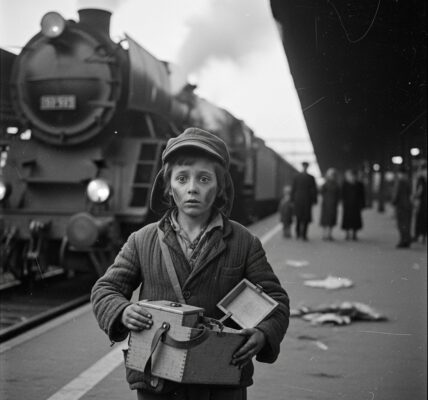The Freedom Meal – Dachau, April 1945
When the gates of Dachau opened in April 1945, an eerie silence enveloped the camp. This silence was not the silence of death, but the silence of a world catching its breath after years of horror. The prisoners, reduced to specters by hunger, beatings, and fear, hardly dared to believe that the American soldiers before them were real. Freedom seemed a fragile mirage, ready to vanish at the slightest gesture.
The survivors moved forward hesitantly, their steps uncertain, their bodies trembling. Their hollow eyes stared at the makeshift tables where bread, bowls of hot soup, and a few army rations lay. For these men who had learned to fear every morsel of food, the moment seemed surreal. Eating, until then, had been an experience linked to anxiety. They had to fight for crumbs, steal at the risk of death, secretly swallow soiled leftovers, fearing the return of hunger with every bite. And now, for the first time in years, they were being offered food, without threats, without humiliation, without conditions.
They sat in small groups on the floor, legs crossed, clutching their bowls as if holding treasure. The air was thick with the simple but powerful scent of steaming soup. No words were spoken. Each person slowly raised the spoon to their mouth, as if afraid the dream would collapse at the first sip. It was a silent, sacred, almost religious meal.
One of the survivors, his hands trembling, his voice broken by months of enforced silence, finally dared to whisper:
” We eat freely.”
These words, simple and fragile, resonated like a prayer. They spread among the seated groups, floating in the air like a blessing. Some nodded silently, others let tears flow, mingling with the pieces of bread they held. This meal was not just an act of survival. It was becoming a ritual of rebirth, a communion where every sip signified: We are still alive. We are still human.
The American soldiers, discreet witnesses to the scene, understood then that they were witnessing something greater than a simple sharing of food. They saw dignity being rebuilt, the memory of humiliations transformed into a moment of fraternity. These men who had been deprived of everything, of their freedom, their identity, their humanity, came together around a universal gesture: eating together.
At Dachau, in the spring of 1945, the meal became a symbol. A symbol of human resilience , of the ability to be reborn even amidst ruins, a symbol of humanity surviving barbarism. In each bowl of soup, there was much more than food: there was the promise of a future, the recognition that life could go on, and that the memory of this suffering must now serve as a bulwark against oblivion.
This moment will remain etched in the stories of those who experienced liberation. Not as a festive banquet, but as a silent liturgy, a communion of tears, gratitude, and a tiny hope. The man who spoke the words, “We eat in freedom,” had given everyone a common language to translate the unspeakable.
Even today, these images of survivors sitting on the floor of Dachau, spoon in hand, remind the world that freedom sometimes begins with the simplest gestures. Eating, drinking, sharing, breathing without fear—this is the true victory over those who sought to erase their humanity.
Thus, the Dachau meal was not just the first meal after liberation. It was a silent victory, proof that brotherhood can rise from the ashes, and that the memory of those moments must continue to illuminate our present.






